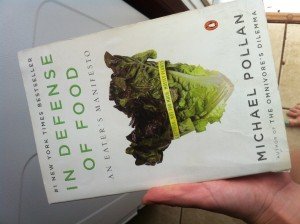

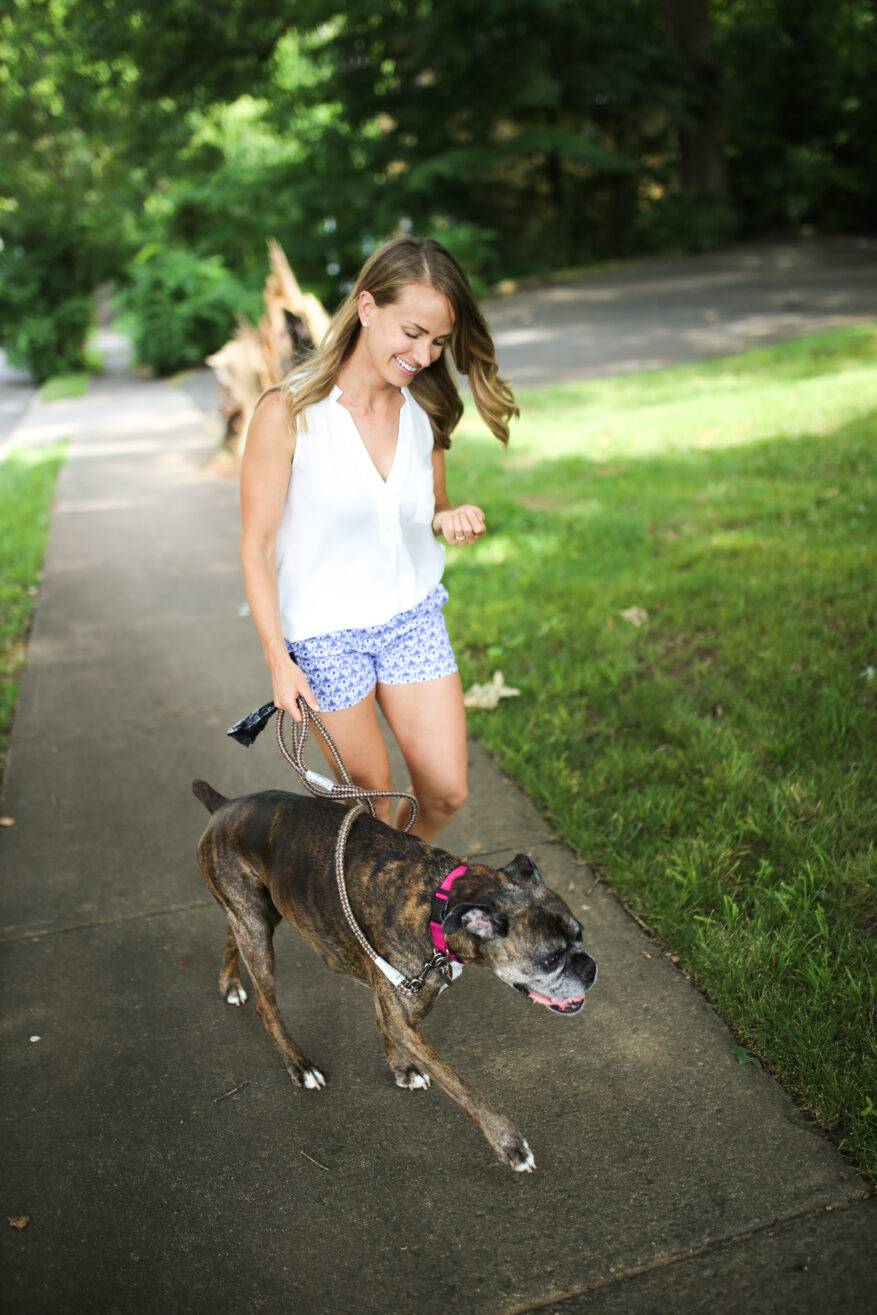
It’s no longer a secret that the last year was intense. Too intense. I was working 80+ hours a week for over a year, training for the Boston Marathon, and my stress reached unhealthy levels. Stress (which can be good in healthy amounts) turned into daily anxiety, which started impacting my health, my sleep, and my relationships. And then I started having panic attacks.
While I knew there was an end in sight since I was planning to quit my Corporate America job, I still had to survive an extremely stressful time. And to be honest, even after I left that job, I still struggled with anxiety. Stress reared its ugly head again last summer when I was dealing with some health issues. Then, we found out that our sweet dog had two types of cancer, and we eventually had to say goodbye the week of Thanksgiving, right as my doctor’s visits ramped up.
Just when I was hoping to get a reprieve in the New Year, coronavirus hit, bringing a whole new wave of stress and anxiety. I hate that I can’t see my family, all of whom lives in Utah. I had to cancel my March trip to see them, my parents had to cancel their trip here and my brother had to cancel his planned May trip too. The main emotion I feel lately is almost like I’m trapped. It’s always been hard living far from family, but I’m especially struggling with it now.
I have ten things that help me cope with stress and I’m sharing those with you too since I know a LOT of us are feeling overwhelmed, anxious, sad, angry, you name the emotion. We’re feeling it all and we’re all feeling it often.
I’ve been working with a therapist for years (more on that below) and she explained that part of my anxiety is a habit my body and mind formed when I was working 80 hours a week. I was running on high all the time — physically and mentally — and I can’t just turn that off. Rather than turning to unhealthy habits like drinking alcohol or scrolling Twitter or Instagram for hours, I developed a set of 10 things that help me calm down, whether I’m on the verge of a panic attack or dealing with chronic, unhealthy levels of daily stress. But I have to actively work to improve my stress and anxiety.
Below are the things I do regularly for stress relief. I’ve been revisiting these things in the midst of the coronavirus crisis, and it’s helped. And I truly hope it helps you too.
I am a firm believer that everyone can benefit from therapy. I have been going to therapy off and on for 15 years, and have been seeing the same one for the past 9 years. There are periods in my life where I’ve seen my therapist multiple times a month and other times I go just once or twice a year.
In some circles therapy has a stigma and in others, it’s trendy to be in therapy. Regardless of your circle, I encourage you to see a therapist at least once a year. You have annual physical exams, right? This is just as important – it’s a checkup for your mental health.
My last two appointments have been teletherapy, where we just chatted on the phone. I actually really enjoyed chatting on the phone and walking, which is another way I manage stress. It was like a 2 for 1! Many therapists are offering virtual therapy as well, if you prefer to have the face-to-face interaction. You CAN still get help even if it’s not in person.
It’s one thing to do all the things to cope with anxiety, but if you’re not working to figure out what is CAUSING it, you’ll be treating a symptom that may never go away. It’d be like going to the dentist every year to get cavities drilled but never brushing your teeth and flossing.
Therapy can help with identifying root causes, as can journalling and spending time with self care to become self-aware, really thinking about what’s causing your stress. You have to give yourself time and space to really think and process. (Therapy helps make that time a priority!) To see a long term improvement with stress, you need to address the root cause. Journalling can also help with this. Even if you can’t fix the root cause right away, understanding what it is, what emotions it triggers and why helps a lot.
I have four very active inboxes and I could easily lose my entire day in emails. While emails don’t go away and I still need to answer them, it helps to pause my inbox and instead set specific times during the day to work through them. Gmail has a Pause Inbox extension that’s free to install and life changing.
I also try to remember to pause it at the end of the work day to help enforce the end of the work day. It’s easy to work all the time when you own your own business or when you work at home since there isn’t a physical separation from your computer. But if my emails are paused, it helps me work a little less. And since feeling like I have to do EVERYTHING as soon as possible is one of my root causes for anxiety, this helps a lot.
I also have all notifications turned off on my phone except text messages and reminders to meditate (more on that below). And, people who text me will tell you that I don’t reply right away! I don’t get any social media notifications, email pop-ups, nothing. I don’t miss having notifications at all, but since I still have a bad habit of checking my phone a lot, I often put it in another room while I’m working. Simply being away from my phone relieves stress.
I’m not a huge essential oils person. I mean, I have a ton because they smell good but I don’t really use them — except lavender. I use it multiple days a week in a diffuser in my office.
Lavender is one of the most-studied oils as it relates to relaxation and research suggests it can help with anxiety. When I remember to diffuse, I often tend to take longer, deeper breaths to take in the scent – and slow, deep breathing also helps with anxiety.
I was not a good example of this over the last year, sleeping sometimes just 5-6 hours a night even when running 50-60 miles a week. And I firmly believe not sleeping enough made my stress and anxiety worse and it’s certainly not good for my health.
Now that I’m in “recovery mode” from the stress of the past year, I’m letting my body have the sleep it wants and needs. What does that look like? In the first few weeks after running the Boston Marathon and after quitting my corporate job, I was sleeping 9-11 hours a night. While I’m no longer sleeping that much, I’m still sleeping 7-8 hours. Yes, it feels weird to wake up so late after waking up between 5am for the past 15 years. But, my body clearly needs it and my stress levels are significantly better when I’m well rested.
If you have a hard time falling asleep, there are a few things you can do to help: NO electronics for one hour before bed (including your phone), dim the lights, eat dinner at least 3 hours before bed and create a routine that you do every night. That may be taking a bath, reading a book or doing a night-time meditation. Just find something that helps you relax and that you’ll be consistent with each night. My routine is to go upstairs to my bedroom about 45 minutes before I want to fall asleep. I wash my face and read a book until I start getting groggy, and then turn lights out immediately, usually around 10:30.
Just going on a leisurely walk or going on a run does wonders for my head and is one of the quickest ways for me to reduce stress. I need to time to breath and think, without being able to do anything else. The fresh air REALLY helps calm me down and it’s even better when I leave my phone at home. Walking has also helped me deal with the loss of Maizey, since she was my walking partner for 11 years.
Research shows that getting outside can improve your mood. This is an easy one to implement if you make it a priority!
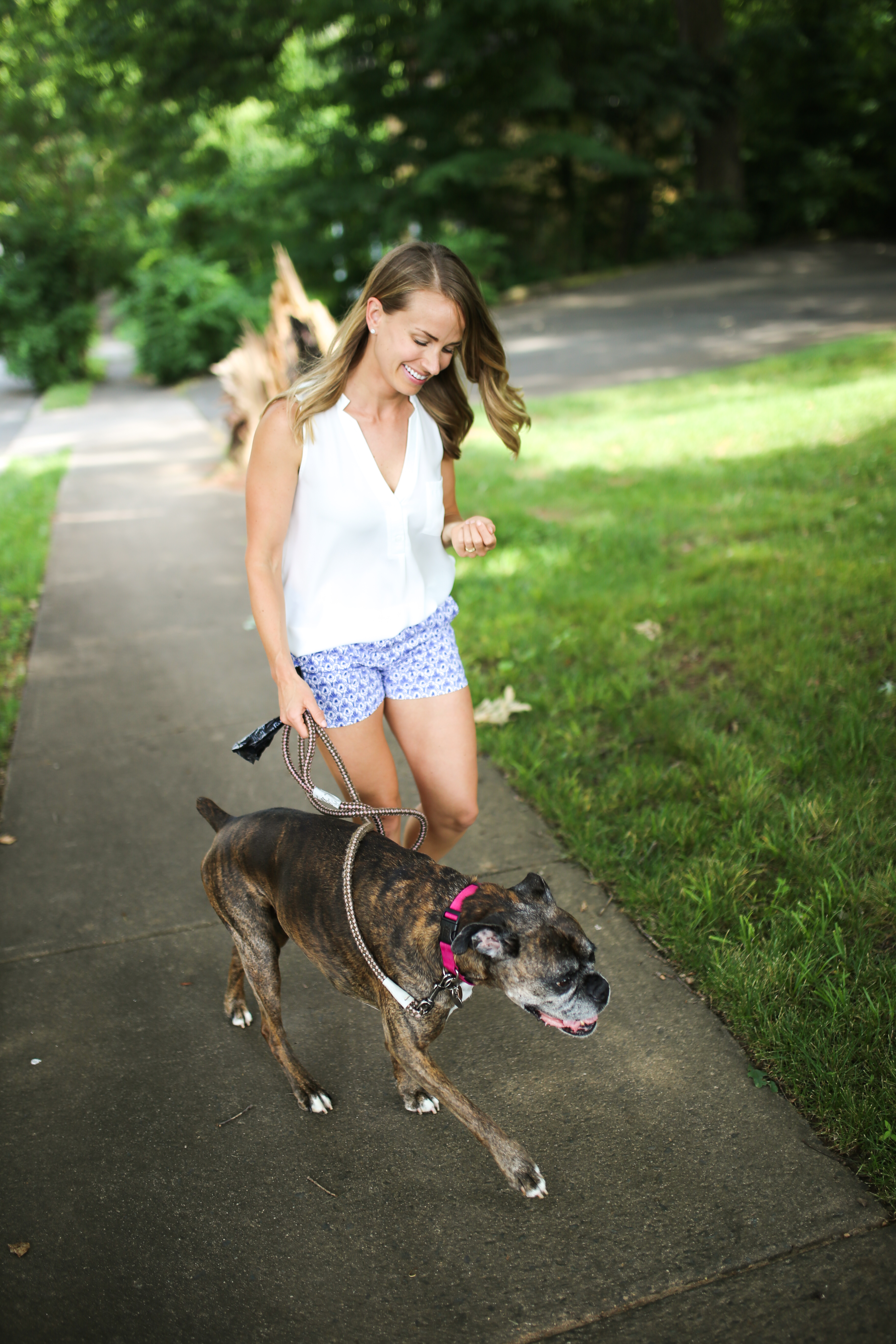
I LOVE music, almost all kinds of music. While I’m working, I prefer classical music so I can focus better. And while I often run without music for various reasons, sometimes running is even better because of music. When I’m feeling super anxious, I’ll often listen to soothing music while walking. (Again, a double dose of two stress-relieving activities!)
When I’m super stressed out or trying to prevent a panic attack (I can sometimes feel them coming on and other times they hit out of NOWHERE), I sit on our porch swing with my earbuds in, just listening to my favorite playlist.
Music therapy is a thing for a reason – it can really help with stress reduction.
After reading 10% Happier, I tried to start meditating more consistently. And I cannot speak highly enough about it for stress management. I’m not super consistent (yet!) with a daily practice, but I typically meditate 3-4x a week. Some meditation uses guided visualization and other include breathing exercises. Try a few different types and see what resonates with you most! I tend to feel stress physically as tightness in my chest and throat, so I really love the breathing exercises to help fill my lungs and slow my breath.
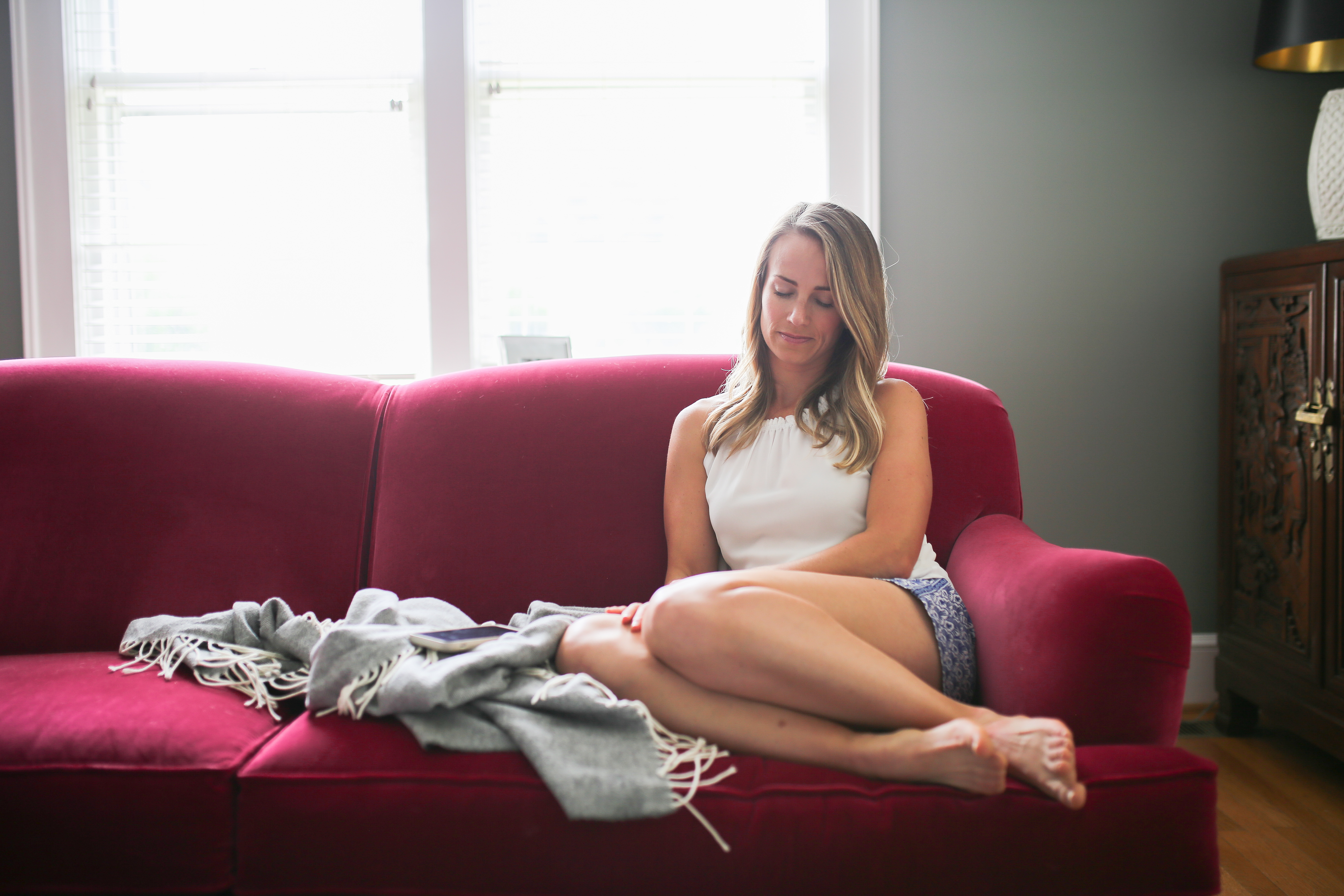
Meditating is kind of like running – I never regret doing it, even when I don’t feel like doing it. I use the Waking Up app, which is free but I pay for the upgraded service since I like some of the lessons. I also take the Peloton meditation classes.
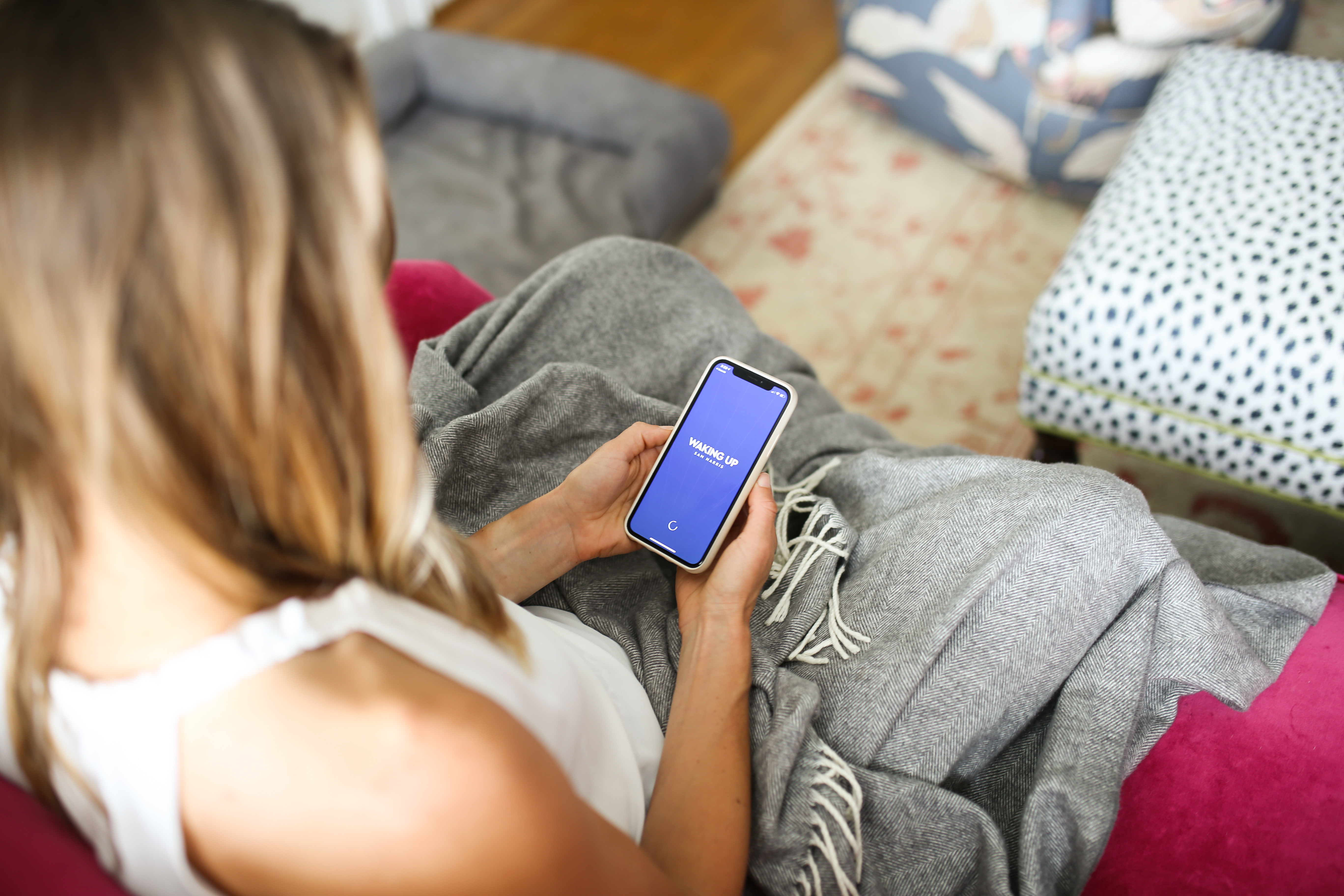
Insight Timer is another app that has more free options but I like the consistency of Waking Up. Insight Timer has SO much variety, which is great for some people, but I like to know what I’m getting rather than starting one and realizing I don’t like the music, the guided voice, whatever. Headspace is another great meditation app that I used for a while.
I have to literally schedule downtime in my day since I have a habit of working nonstop. Since I work by myself most days, it’s easy to go all day without meaningful breaks or without interacting with anyone else.
When you’re in an office, you get natural breaks. Coworkers stop by to chat, you get get coffee, you go out for lunch, etc.. I don’t have that unless I’m VERY intentional about it since coffee and food are all ten steps away. And, I bet you don’t have that right now either since most of us are NOT working in an office.
It’s so easy to feel isolated when you’re stressed or anxious because you just want to work all the time, thinking you’ll finally get caught up and things will feel better. But, I’ve found that working nonstop and/or isolation makes things significantly worse. Scheduling virtual lunch dates with friends or calling my friends and family instead of texting really helps.
My most consistent coping mechanism is running, and multiple studies show that exercise can improve mood disorders in some patients as much as prescription medications!
While I don’t run every day, I run most days. It’s one of my favorite parts of my day, but another reason I run is because it helps manage my stress and anxiety. Without it, I firmly believe I would struggle even more. (If you want to take up running since all the gyms are closed, sign up for my running newsletter here.)
Aside from running, I find that slow strength training is a great stress reliever. I zone out to my favorite playlist and since I use my breath so much when I life, it’s very calming. While I love HIIT (high intensity interval training), my body and mind crave slower movements when I’m super stressed. I also love yoga for reducing stress since I definitely can’t think about anything else during yoga! It’s like moving meditation, where my brain just stops spinning for a bit. There are a lot of great apps for lifting and yoga at home – see my round-up here.
It doesn’t matter so much what type of workout you do. Just find some form of physical activity that helps calm you. Exercise helps reduce stress hormones, including cortisol, which is why so many therapists recommend it.
Not everything that I do will work for you, but I truly hope some or all of these help you manage stress and/or anxiety in your own life. If you only take away two things from this post, it’s these:
A good therapist can truly help change your life. And don’t be afraid to shop around. It may take a couple tries to find the right therapist. Be sure to check your health insurance as well – many plans will cover part of your bills, if not the entire bill, up to a certain number of visits.
And remember, unless you see a psychiatrist, you’ll need to see your primary care provider to get any necessary prescriptions for anxiety. Having a good relationship with your PCP and a therapist can help you make the right decision.
I’ve been on daily anxiety meds in the past and it helped a LOT. I was very hesitant, but my doctor explained it this way: with anxiety, your brain is like a snow globe being shaken all the time. Medication helps the snow settle so you can think more clearly and make better decisions. Again, talk to your doctor and get help if you need it.
Working with a therapist or doing some work solo (and I mean work!), identify the root cause of your anxiety. I’m a firm believer in treating the cause of a problem so it becomes less of a problem over time.
What do you do for stress relief?
Note: I am NOT a licensed therapist. I’m simply sharing my experience dealing with stress, anxiety and panic attacks and what has helped me. PLEASE seek the help of a professional for your anxiety.


Leave a Comment
14 responses to “Stress Relief Tips: I have anxiety…here’s what helps.”
I appreciate you talking openly about stress and anxiety. This is something I deal with, too, and can +1 literally everything on this list!
I know it helped me a lot when others told me they dealt with anxiety so I hope I can help others feel less alone too!
[…] I have anxiety. Here’s what helps. from A Foodie Stays Fit IG: @afoodiestaysfit […]
thanks so much for sharing your thoughts on anxiety! i had no idea that pausing an inbox was a thing! and while i know that meditation and therapy would be good for me (used to go to a therapist regularly, but got out of the habit somewhere along the way and really need to get back to it), i’m just bad at putting it into practice. but just knowing that i’m not alone is helpful too, so thank you for being open about your anxiety!
Inbox pausing is LIFE! 😉 I have reminders turned on in my meditation apps so I get prompted to meditate every afternoon. Sometimes I ignore it, but I’m always glad when I don’t! 🙂
I have anxiety too. Test anxiety paralyzed me in college and kept me out of vet school. Back then, I didn’t even know I could get help for it.
Now, stress can make me generally anxious but I’m good unless something crazy is happening (ex parental health issues or constant awfulness at work). I’ve even had FMLA for migraines due to stress.
If I take good care of myself- 7+ hours of sleep a night, downtime to cuddle with my dogs, exercise, and healthy meals- my anxiety is much more manageable. Thanks for sharing! It isn’t fun to be anxious.
oh man, migraines are TERRIBLE. My mom had debilitating ones when I was a kid and it was just so awful for her.
Sleep and downtime are SO important! I sometimes have to schedule downtime but hey, it works. 🙂
I really appreciate you sharing this.
I started having panic attacks about a year after the birth of my second daughter, in 2015. They continued for about a year, and it was one of the hardest years of my life. Those panic attacks made me want to die (while they were going on) and worrying about having them really sucked the joy out of life for me. It was so hard. It’s really always nice to know I’m not alone. Most of my panic attacks would happen when my husband was out of town on business and I was alone with the kids, and it was very isolating.
In case you were wondering, what worked for me was: (a) vigorous exercise 6 days a week (mostly running) (b) Zoloft plus Clonazepam as a rescue med (c) Daily meditation using the Calm app and (d) Therapy. I found it helpful to see a psychiatrist rather than a GP. I’ve had maybe two panic attacks in the last couple years, both minor, and am no longer on meds, out of therapy, and no longer meditating. But I’m now expecting number three, and I fear it may happen again. If it does, though, I feel like I at least know the tools to “get well.”
I really hope you find what works for you. It sounds like you’re doing better. You’re definitely not alone.
It is SO helpful to know you’re not alone. I’m actually pretty nervous about kids someday because I’ve heard from a lot of people that anxiety gets worse when you have children. Knowing what helps you comforts me a lot. Thank you so much!
One of the things you mentioned that I really like is that it is true that you shouldn’t be afraid to seek out professional help. Asking a friend can help for a little bit, but it won’t do all that much. I don’t think I have a lot of stress from work but I do think it would help me to get some help with it.
These are great tips! Thank you for sharing! I think pausing the phone will be a gamechanger for me.
So glad you found it helpful!!
[…] I credit my mom for my love of reading. She was an elementary school librarian for over 20 years and almost always has a book in hand, if she’s not running, Crossfitting or cooking. I read every single night in bed to wind down. And since I’ve been spending more time at home on the weekends (my weekdays haven’t changed that much), I’ve been reading 1-2 hours in the middle of the day, which feels so luxurious. I used to read for HOURS at a time and finish books in 1-2 days, and that never happens now unless I’m on vacation. But adding just 1-2 hours in the middle of the day brings me so much joy (and really helps with stress!). […]
Great post, and I am looking forward to implementing some of your practices. Thank you!